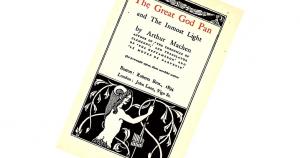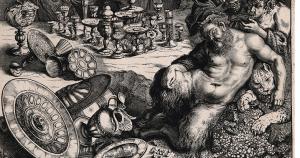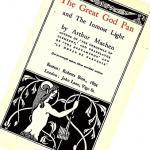 Some are damned like Macbeth, men with great potential slowly dragged to hell with prophetic warnings, ghosts, and horror. Then there are the rest of us, damned by our comfy chair which tempts us to watch just one more episode of Hell’s Kitchen and listen to Gorden Ramsey bleep away our pain.
Some are damned like Macbeth, men with great potential slowly dragged to hell with prophetic warnings, ghosts, and horror. Then there are the rest of us, damned by our comfy chair which tempts us to watch just one more episode of Hell’s Kitchen and listen to Gorden Ramsey bleep away our pain.
We don’t do anything and so are people neither hot nor cold and so spewed from God’s mouth. We are the Wall-E people in our comfy chairs: dullards damned. Dante places countless souls on the outskirts of Hell, not good, so unable to go to Heaven, but lacking any particular vice so that the better parts of Hell will not have them:
And he to me: “This miserable mode Maintain the melancholy souls of those Who lived withouten infamy or praise. Commingled are they with that caitiff choir Of Angels, who have not rebellious been, Nor faithful were to God, but were for self. The heavens expelled them, not to be less fair; Nor them the nethermore abyss receives, For glory none the damned would have from them.”
Being damned for being pathetic, riding the comfy chair to Hell, is pitiable. The Devil has to take you, but would rather not.
A father of modern horror literature Arthur Machen understood the damnation of the comfy chair well. At the end of the Victorian era, Machen observed the intentional, orgiastic evil of the Oscar Wilde set and of the occultists who tried to defeat materialism with diabolism. He knew the vile horror of both tactics, but had an odd respect for those who sinned boldly as opposed to the conformists who slipped into Hell almost bashfully “for glory none the damned would have from them.”
Machen was a prophet who saw that materialism was making us lukewarm: too cool for revolutions, too hot for parliaments. He saw Wilde saved for the Church at the end: bold to the end. He retreated from magic, crippled by the exposure, and embraced the miracle of Jesus at the altar. In his short story The White People Machen tried to define the problems of our time and the chief was the Comfy Chair and not the saint or the social sinner.
We hear the cosmos and we mishear, too lazy to learn or focus on what is being said. We do not even sin as well as Wilde or Machen, because we do not bother to find either the right way to the truth or the wrong way to the great lies. Machen uses a Victorian phrase “Hobson Jobson” to describe our folly: we hear something complex, beautiful, and vital and we turn it into some rhyming slang in words we already know. Evidently British soldiers heard Indian religious speaking about a holy things and could not be bothered to reject or accept these ancient mysteries, but merely reduced the sounds to the English “Hobson Jobson” and had a laugh.
Damned by facile damning.
Let’s pick up a bit of dialog from the story that sums up Machen. I will bold key passages:
‘ ‘But you used the word “unconscious” just now, of Keats’ reviewers. Is wickedness ever unconscious?’
‘Always. It must be so. It is like holiness and genius in this as in other points; it is a certain rapture or ecstasy of the soul; a transcendent effort to surpass the ordinary bounds. So, surpassing these, it surpasses also the understanding, the faculty that takes note of that which comes before it. No, a man may be infinitely and horribly wicked and never suspect it. But I tell you, evil in this, its certain and true sense, is rare, and I think it is growing rarer.’
‘I am trying to get hold of it all,’ said Cotgrave. ‘From what you say, I gather that the true evil differs generically from that which we call evil?’
‘Quite so. There is, no doubt, an analogy between the two; a resemblance such as enables us to use, quite legitimately, such terms as the “foot of the mountain” and the “leg of the table.” And, sometimes, of course, the two speak, as it were, in the same language. The rough miner, or “puddler,” the untrained, undeveloped “tiger-man,” heated by a quart or two above his usual measure, comes home and kicks his irritating and injudicious wife to death. He is a murderer. And Gilles de Raiz was a murderer. But you see the gulf that separates the two? The “word,” if I may so speak, is accidentally the same in each case, but the “meaning” is utterly different. It is flagrant “Hobson Jobson” to confuse the two, or rather, it is as if one supposed that Juggernaut and the Argonauts had something to do etymologically with one another. And no doubt the same weak likeness, or analogy, runs between all the “social” sins and the real spiritual sins, and in some cases, perhaps, the lesser may be “schoolmasters” to lead one on to the greater—from the shadow to the reality. If you are anything of a Theologian, you will see the importance of all this.’
‘I am sorry to say,’ remarked Cotgrave, ‘that I have devoted very little of my time to theology. Indeed, I have often wondered on what grounds theologians have claimed the title of Science of Sciences for their favourite study; since the “theological” books I have looked into have always seemed to me to be concerned with feeble and obvious pieties, or with the kings of Israel and Judah. I do not care to hear about those kings.’
Ambrose grinned. ‘We must try to avoid theological discussion,’ he said. ‘I perceive that you would be a bitter disputant. But perhaps the “dates of the kings” have as much to do with theology as the hobnails of the murderous puddler with evil.’
‘Then, to return to our main subject, you think that sin is an esoteric, occult thing?’
‘Yes. It is the infernal miracle as holiness is the supernal. Now and then it is raised to such a pitch that we entirely fail to suspect its existence; it is like the note of the great pedal pipes of the organ, which is so deep that we cannot hear it. In other cases it may lead to the lunatic asylum, or to still stranger issues. But you must never confuse it with mere social misdoing. Remember how the Apostle, speaking of the “other side,” distinguishes between “charitable” actions and charity. And as one may give all one’s goods to the poor, and yet lack charity, so, remember, one may avoid every crime and yet be a sinner.’
‘Your psychology is very strange to me,’ said Cotgrave, ‘but I confess I like it, and I suppose that one might fairly deduce from your premisses the conclusion that the real sinner might very possibly strike the observer as a harmless personage enough?’
‘Certainly; because the true evil has nothing to do with social life or social laws, or if it has, only incidentally and accidentally. It is a lonely passion of the soul—or a passion of the lonely soul—whichever you like. If, by chance, we understand it, and grasp its full significance, then, indeed, it will fill us with horror and with awe. But this emotion is widely distinguished from the fear and the disgust with which we regard the ordinary criminal, since this latter is largely or entirely founded on the regard which we have for our own skins or purses. We hate a murderer, because we know that we should hate to be murdered, or to have any one that we like murdered. So, on the “other side,” we venerate the saints, but we don’t “like” them as we like our friends. Can you persuade yourself that you would have “enjoyed” St Paul’s company? Do you think that you and I would have “got on” with Sir Galahad? ‘So with the sinners, as with the saints. If you met a very evil man, and recognized his evil; he would, no doubt, fill you with horror and awe; but there is no reason why you should “dislike” him. On the contrary, it is quite possible that if you could succeed in putting the sin out of your mind you might find the sinner capital company, and in a little while you might have to reason yourself back into horror. Still, how awful it is. If the roses and the lilies suddenly sang on this coming morning; if the furniture began to move in procession, as in De Maupassant’s tale!’
‘I am glad you have come back to that comparison,’ said Cotgrave, ‘because I wanted to ask you what it is that corresponds in humanity to these imaginary feats of inanimate things. In a word—what is sin? You have given me, I know, an abstract definition, but I should like a concrete example.’
‘I told you it was very rare,’ said Ambrose, who appeared willing to avoid the giving of a direct answer. ‘The materialism of the age, which has done a good deal to suppress sanctity, has done perhaps more to suppress evil. We find the earth so very comfortable that we have no inclination either for ascents or descents. It would seem as if the scholar who decided to “specialize” in Tophet, would be reduced to purely antiquarian researches. No palæontologist could show you a live pterodactyl.’
The day might come, if Machen is correct, when an antichrist will appear and begin to rule in the seat of our nation, but we will be too busy binging on Netflix to watch his antics. We are not saints, too busy running up our score on Star Trek: Timelines. We are not great sinners: going out requires too much energy. Machen points out that we hate the social sinner, because he disrupts our time in the comfy chair: the vandals force us to go clean up, viewing entire episodes of our favorite series must be delayed. We do not mind the great sinner, the real antichrist, because he does his necromancy in private and is empowered in public. If he can give us 5g and leave us alone, then we will take his mark without noticing.
Great saints and great sinners are both hard to make chums. We prefer the safe way, the lukewarm way, the way that leads to promotion in the company and a thin Human Resources file. As for theology, we cannot be bothered or we turn to trivialities like the chronology of the kings of Israel. The Good Book becomes a story hard enough so we are waiting fo the film. We live in an age of antichrists rising up to rule, but lack the energy to follow, only acquiesce. It is the last time, but we hope to squeeze in one more Marvel movie before the apocalypse.
Little children, it is the last time: and as ye have heard that antichrist shall come, even now are there many antichrists; whereby we know that it is the last time.













